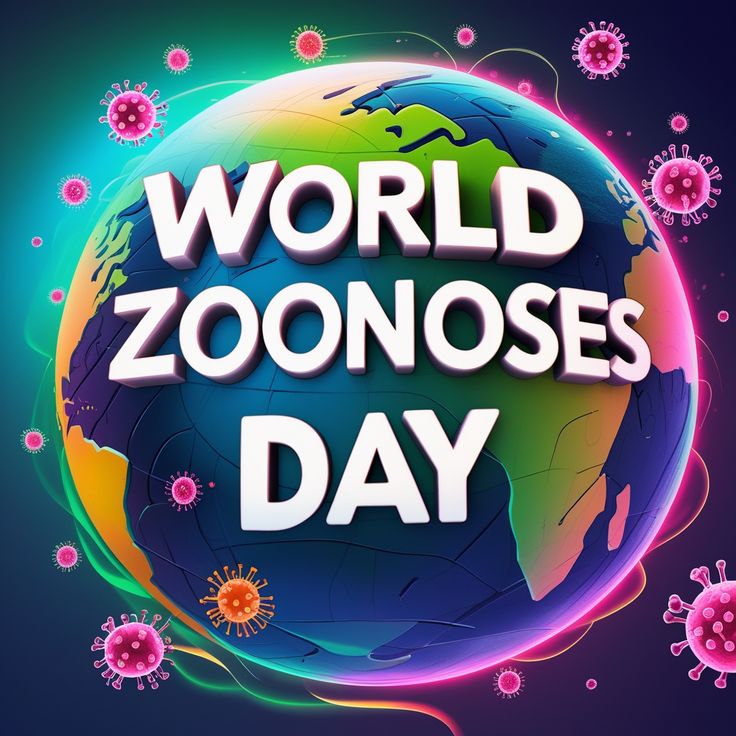🦠 World Zoonoses Day: History, Significance, Facts, FAQs, Timeline & Why It Still Matters
When a virus makes the leap from animals to humans, it doesn’t just change biology—it rewrites history. From the bubonic plague to COVID-19, zoonotic diseases have reshaped civilizations, destroyed economies, and exposed the fragile link between humans and the animal world.
- 🗓️ Timeline: The Evolution of World Zoonoses Day
- 🧬 What Are Zoonotic Diseases?
- 🧪 History of World Zoonoses Day
- 🌍 Why World Zoonoses Day Is So Important Today
- 📌 7 Alarming Facts About Zoonotic Diseases
- 🤝 How It’s Observed Globally
- 🧠 What Is the “One Health” Concept?
- ✉️ Heartfelt Wishes & Messages for World Zoonoses Day
- ❓ Frequently Asked Questions (FAQs)
- Q1. When is World Zoonoses Day celebrated?
- Q2. Why is World Zoonoses Day important?
- Q3. Is COVID-19 a zoonotic disease?
- Q4. What are the most dangerous zoonotic diseases today?
- Q5. How can we prevent zoonotic diseases?
- 🎯 Key Takeaways
- 🧭 Daily Life Impact
- 📝 Conclusion: Why World Zoonoses Day Isn’t Optional—It’s Essential
World Zoonoses Day, observed every July 6th, is a powerful reminder of how one act of prevention can save millions of lives. It’s not just about diseases—it’s about responsibility, science, and compassion.
Let’s explore the origins, key facts, emotional depth, and ongoing relevance of this critically important yet under-discussed day.
🗓️ Timeline: The Evolution of World Zoonoses Day
| Year | Event |
|---|---|
| 1885 | Louis Pasteur successfully administers the first rabies vaccine to a human—Joseph Meister. |
| 1900s–2000s | Outbreaks of zoonotic diseases like the Spanish Flu, SARS, Ebola, and H1N1. |
| 2007 | WHO warns of a future pandemic stemming from zoonotic origins. |
| 2020 | COVID-19 pandemic highlights zoonoses on a global scale. |
| Present | July 6th observed globally to promote awareness and prevention of zoonotic diseases. |
🧬 What Are Zoonotic Diseases?
Zoonoses (or zoonotic diseases) are infectious diseases that are transmitted from animals to humans. These diseases can be viral, bacterial, fungal, or parasitic, and they account for over 60% of all emerging infectious diseases in humans.
Some common zoonotic diseases:
Rabies
Avian flu
Ebola
Brucellosis
Leptospirosis
COVID-19 (likely zoonotic in origin)
🧪 History of World Zoonoses Day
World Zoonoses Day is commemorated on July 6th, the date in 1885 when Louis Pasteur administered the first successful rabies vaccination to a human. This groundbreaking event marked the beginning of modern preventive medicine in zoonotic diseases.
The day is not officially recognized by the UN but is widely observed by public health institutions, veterinarians, NGOs, and scientists to promote awareness of zoonotic risks and prevention.
🌍 Why World Zoonoses Day Is So Important Today
🔥 Because the Next Pandemic Could Be Lurking in the Wild
More than 75% of new infectious diseases in the last 3 decades are of zoonotic origin.
Climate change, deforestation, and illegal wildlife trade have increased human-animal interactions, making outbreaks more likely.
🚨 It’s Not Just About Animals
Zoonoses affect:
Livelihoods: Farmers and workers in animal husbandry face constant risk.
Global Health: Diseases can spread rapidly through global travel.
Food Security: Infected livestock can disrupt entire supply chains.
Mental Health: Pandemic-related fear and isolation have long-lasting effects.
📌 7 Alarming Facts About Zoonotic Diseases
🧬 Over 200 known zoonotic diseases exist today—many without a vaccine.
🦠 COVID-19 has cost the world over $12 trillion in economic loss—likely zoonotic in origin.
🌲 60% of emerging infectious diseases are zoonotic and are rising due to habitat destruction.
🐷 Swine Flu (H1N1) killed more than 284,000 people globally.
🦇 Bats are reservoirs for 137+ viruses that could jump to humans.
💉 Rabies, the most well-known zoonosis, kills 59,000+ people annually, mostly in Asia and Africa.
🛡️ Most zoonoses are preventable through vaccination, hygiene, and responsible animal management.
🤝 How It’s Observed Globally
🩺 Medical & Veterinary Communities:
Free rabies vaccination camps for pets and stray animals.
Workshops and awareness sessions on zoonotic disease control.
Educational campaigns in rural and urban areas.
🏫 Schools & Universities:
Seminars and lectures on public health, microbiology, and One Health concept.
Student competitions: posters, debates, essays on zoonoses.
🌐 Online Observance:
Use of hashtags like #WorldZoonosesDay, #StopZoonoses, and #OneHealth.
Virtual conferences hosted by WHO, FAO, and OIE.
🧠 What Is the “One Health” Concept?
A globally adopted model, One Health recognizes the interconnectedness of humans, animals, and the environment. It emphasizes collaborative efforts from multiple disciplines—medicine, veterinary science, ecology, and sociology—to control and prevent zoonotic diseases.
✉️ Heartfelt Wishes & Messages for World Zoonoses Day
“A healthier world begins with shared responsibility. Let’s break the chain of zoonoses. 🌍🩺”
“On World Zoonoses Day, protect the paws, protect the people. 🐶👨👩👧👦”
“Vaccinate, educate, and advocate—for the safety of both animals and humans.”
“Prevent the next pandemic by protecting what matters—our bond with nature.”
❓ Frequently Asked Questions (FAQs)
Q1. When is World Zoonoses Day celebrated?
A: July 6th, marking the day Louis Pasteur administered the first rabies vaccine.
Q2. Why is World Zoonoses Day important?
A: It spreads awareness about zoonotic diseases and promotes the “One Health” approach to prevent future pandemics.
Q3. Is COVID-19 a zoonotic disease?
A: While research is ongoing, it is widely believed that COVID-19 originated from animal-to-human transmission, making it a zoonotic disease.
Q4. What are the most dangerous zoonotic diseases today?
A: Rabies, avian flu, Ebola, Nipah virus, brucellosis, and leptospirosis.
Q5. How can we prevent zoonotic diseases?
A: Through vaccination, hygiene, regulation of animal trade, awareness, and the One Health approach.
🎯 Key Takeaways
📅 Observed on: July 6
🔬 Focus: Preventing diseases transferred from animals to humans
🌍 Goal: Promote global health, sustainability, and responsible animal-human interaction
👥 Observed by: Public health bodies, scientists, vets, NGOs, and individuals
💡 Hashtags to use: #WorldZoonosesDay #ZoonoticAwareness #OneHealth
🧭 Daily Life Impact
Zoonoses may seem like rare, distant threats—but their ripple effects touch our everyday life:
🛒 Food chain security: Contaminated meat can trigger outbreaks.
🧑🌾 Agricultural livelihoods: Farmers can lose income from infected livestock.
🧍♀️ Personal safety: Pet owners, vets, and travelers are often at risk.
🧘♀️ Mental health: Fear of diseases causes stress, especially post-COVID.
The more aware we are, the safer our families, communities, and global neighbors become.
📝 Conclusion: Why World Zoonoses Day Isn’t Optional—It’s Essential
World Zoonoses Day isn’t just a health observance—it’s a warning, a lesson, and a chance. In the age of globalization, a disease that starts in one forest can travel across continents in hours.
The fight against zoonotic diseases is not only a battle of science but also of ethics, empathy, and ecological responsibility.
By understanding the roots of these diseases and preventing them at their source, we’re not just saving human lives—we’re preserving the balance of nature.
So on July 6th and beyond, remember:
The more we respect our connection with animals and the planet, the better chance we have at surviving and thriving together.









rsfwxs